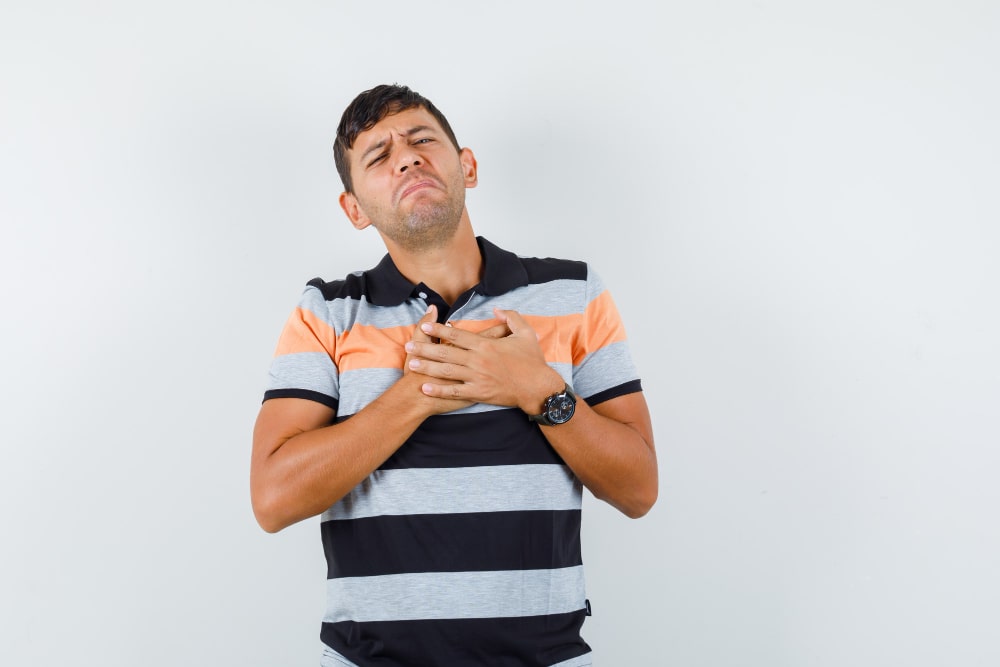Do you experience chest pain on a weekly or daily basis? Do you need help with why this is happening and how to treat it? Chest aches can be caused by numerous underlying issues, but identifying which one is causing the discomfort is key to finding relief. In this article, we’ll discuss the causes of chest aches, common symptom patterns associated with different conditions that cause chest aches, and treatment options for alleviating the symptoms. Read on to find out more!
What is a chest ache?
A chest ache is a pain felt in the chest area, which may be caused by different medical conditions. It may be sharp and stabbing or just a dull ache that persists over time. Chest aches can be associated with chest injuries, chest infections, chest muscle strain, heartburn, and chest wall pain from coughing. It is essential to determine the source of chest aches in order to identify and treat the underlying cause.
Chest pain should never be ignored, as chest aches can sometimes indicate a serious medical emergency such as a heart attack or pulmonary embolism. If chest ache is accompanied by other symptoms such as chest tightness, shortness of breath, dizziness, or sweating, it is important to seek medical attention without delay.
Who is mostly affected by chest aches?
Chest aches can affect anyone, but it is most commonly experienced by those between the ages of 40 and 60. It can be caused by a variety of factors, including stress, poor diet, smoking, or chest injury. People who have existing heart conditions may also experience chest aches more frequently.
Other factors that may increase the risk for chest aches include obesity, high blood pressure, and diabetes. If a chest ache occurs for more than a few minutes or is accompanied by chest tightness or pain, it is important to seek medical attention to determine the underlying cause. Visit your doctor if the chest ache persists, worsens, or affects daily activities.

Cause of Chest Aches
Here are some causes of chest aches include;
1) Heart conditions
Chest ache is one of the most common causes of a heart condition. It can be caused by angina, heart attack, or heart disease. In angina, chest ache often occurs during physical exertion and may be relieved with rest. A heart attack, on the other hand, will cause a chest ache that is more severe and does not improve with rest. Heart disease is a general term for a range of conditions, often associated with chest aches caused by a narrowing or blockage of the arteries.
See your doctor if you are experiencing chest aches, as chest pain could be serious and require medical attention. Treatment and management of chest aches vary depending on the cause and can include lifestyle changes, medication, or in some cases, surgery.
2) Lung conditions
Chest aches are a common cause of several lung conditions, such as pneumonia, pleurisy, and lung cancer. Pneumonia is a nasty infection in one or both lungs, which can cause chest pain when breathing deeply and coughing. Pleurisy is inflammation of the tissue that lines the chest cavity and surrounds the lungs, which can result in chest pain or chest ache.
Lung cancer is the uncontrolled growth of abnormal cells in one or both lungs, which can cause chest aches as it grows and spreads to other body parts. If you experience chest pain or chest ache, discussing these signs with your doctor as soon as possible is important.
3) Gastrointestinal issues
Chest aches can be caused by gastrointestinal issues such as acid reflux, indigestion, or peptic ulcer cancer. Acid reflux occurs when stomach acids rise into the esophagus and cause chest discomfort, typically felt as burning chest pain. Indigestion is an uncomfortable feeling in the chest caused by inefficient digestion of food, which can lead to chest discomfort.
Peptic ulcer cancer is a tumor that grows in the stomach or small intestine and causes chest pain when it bleeds or becomes blocked. Treatment for chest aches caused by gastrointestinal issues typically involves lifestyle modifications and medications to reduce acid production or promote healing of the esophagus or stomach lining.
4) Muscle or bone problems
Chest aches can also cause by muscle or bone problems. A pulled muscle in the chest wall, chest wall strain, or a fractured rib can lead to chest aches ranging from mild to severe pain. It is important to seek medical attention if a chest ache persists or worsens, as there could be underlying issues causing it.
Treatment for chest aches caused by muscle or bone problems may include rest, ice/heat application, stretching, medications for pain relief, and, in some cases, physiotherapy. If the chest ache persists or worsens, it is important to discuss it with your doctor to determine the cause and appropriate treatment plan.
5) Psychological factors
Several psychological factors, such as anxiety or panic attacks, can cause chest aches. Anxiety can cause chest pain which may describe as chest tightness or pressure. The chest pressure associated with a panic attack is often severe and can even feel like a heart attack. Other symptoms of chest aches due to anxiety include shortness of breath, chest tightness, or chest pain during physical exertion.
It is important to understand the underlying cause of chest aches in order to manage them effectively. Treatment may involve cognitive behavioral therapy, relaxation techniques, and lifestyle modifications. If chest ache persists despite self-care measures, seeking medical advice is recommended.
Read More: Throbbing Tooth Pain: Causes, Symptoms, Treatments
Symptoms of chest aches
Chest pain can present with various symptoms, including:
1. A squeezing or pressure sensation in the chest.
2. Discomfort that spreads to the arms, neck, jaw, or back.
3. Shortness of breath, sweating, or dizziness.
4. Rapid or irregular heartbeat.
5. Nausea or vomiting.
6. Chest tightness or fullness.
7. Sharp or stabbing pain.
These symptoms can indicate a range of conditions, from benign to severe. It is essential to seek medical attention if you experience chest pain.
Diagnosis of chest ache
Diagnosis of chest pain usually involves a combination of the following steps:
Medical history review: The doctor will ask about symptoms, duration, and other relevant information.
Physical examination: The doctor will perform a physical examination to check for any signs of distress, such as heart rate, blood pressure, or breathing patterns.
Laboratory tests: Blood tests, electrocardiogram (ECG), or chest X-rays may be ordered to help diagnose the cause of chest pain.
Imaging tests: Tests such as computerized tomography (CT) scans or magnetic resonance imaging (MRI) may use to better look at the internal structures of the chest.
Cardiac tests: Specific tests such as an echocardiogram, a stress test, or a coronary angiogram may order to evaluate the functioning of the heart and blood vessels.
Gastrointestinal tests: Endoscopy, upper GI series, or stool tests may use to evaluate the digestive system if the doctor suspects a gastrointestinal cause of chest pain.

Prevention of chest aches
Prevention of chest pain depends on its underlying cause, but some general steps that can help reduce the risk include:
Lifestyle changes:
- Maintaining a healthy diet.
- Regular exercise.
- Quitting smoking.
- Reducing stress can help prevent heart disease and reduce the risk of chest pain.
Medications: Taking medications as prescribed, such as aspirin or statins, can help prevent heart disease and reduce the risk of chest pain.
Monitoring and managing underlying conditions: Regularly monitoring and managing conditions such as high blood pressure, high cholesterol, or diabetes can help prevent heart disease and reduce the risk of chest pain.
Avoiding triggers: Avoiding triggers such as alcohol, caffeine, and spicy or fatty foods can help prevent indigestion and reduce the risk of chest pain.
Staying active: Regular physical activity can help strengthen the heart, reduce stress, and reduce the risk of chest pain.
Treatment of chest aches
Treatment for chest aches depends on the underlying cause, but some general approaches include:
- Medications: Over-the-counter pain relievers, anti-anxiety medications, or nitrates may prescribe to relieve chest pain.
- Lifestyle changes: Making changes to your diet, exercise habits, and stress levels can help reduce chest pain.
- Surgery: In some cases, surgery may be necessary to treat the underlying cause of chest pain, such as a heart valve problem or a blocked coronary artery.
- Procedures: Procedures such as angioplasty or stenting can open blocked arteries and improve blood flow to the heart.
- Therapy: Psychological therapy, such as cognitive-behavioral therapy, may recommend for treating anxiety-related chest pain.
- Emergency measures: In the case of a heart attack, prompt emergency treatment with drugs or procedures to restore blood flow to the heart may be necessary.
It’s important to seek medical attention if you experience chest pain, as it can be a sign of a serious condition. Treatment options will depend on the underlying cause and the severity of the symptoms.

Final Thought
When it comes to chest aches, it is important to be aware of the many possible causes and to seek medical attention if symptoms persist. Many chest aches can treat easily with over-the-counter medications, but some may require more serious medical intervention. As such, chest aches should always take seriously and assessed by a medical professional as soon as possible.
The final thought when it comes to chest aches is that prevention is the best way to avoid future chest pains or other related issues. Eating a balanced diet, exercising regularly, and avoiding risky activities are great ways to ensure chest pain does not become an issue. Taking measures like these can help reduce chest discomfort and increase overall well-being for years to come.

